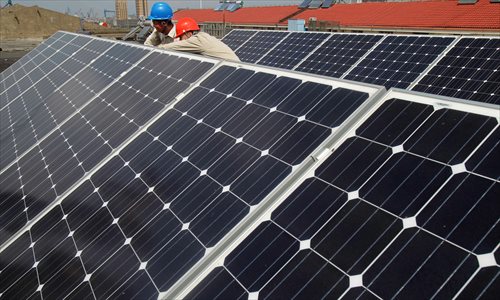HOME >> BUSINESS
Canada launches solar anti-dumping probe
By Chu Daye Source:Global Times Published: 2014-12-8 10:10:13

Technicians check solar panels at a rooftop photovoltaic power station in East China’s Jiangsu Province in August 2013. Photo: IC
A decision by Canada to launch an anti-dumping and anti-subsidy probe into Chinese solar products will not cause substantial damage but does serve as a reminder for Chinese companies to boost their core competitiveness, experts said Sunday.
The Canada Border Services Agency (CBSA) said on its website Friday that it had initiated investigations "under the Special Import Measures Act respecting the alleged injurious dumping and subsidizing of certain photovoltaic modules and laminates originating in or exported from China."
The CBSA said the investigations followed a complaint filed by four Ontario-based Canadian companies – Eclisall Energy Corporation, Heliene Inc, Silfab Ontario Inc, and Solgate Inc.
"We do not treat this as a serious threat. The major markets now for solar products around the world are Japan, the US and China. The Canadian market is a small one," said Meng Xian'gan, deputy director of the China Renewable Energy Society, noting that his society has heard about the case but has not yet decided on how to react.
"This is not something new. We have been through this with the EU and the US. It actually highlights the competitiveness and status of Chinese solar products on the world stage," Meng told the Global Times Sunday.
China's solar industry was hit by steep duties levied by the US in 2012, and the US Department of Commerce announced in January 2014 that it would launch another round of anti-dumping and anti-subsidy investigations into solar power products produced by Chinese companies.
A final ruling on the investigations is expected in mid-December, Beijing-based Securities Daily reported on November 14.
Zhao Zheng, a professor at the School of Economics and Resource Management at Beijing Normal University, told the Global Times that there will probably be more probes by foreign countries against Chinese solar products in the future.
"I believe the Canadian government was under pressure from its domestic companies. Because China's labor costs are not as high as in Western countries, its solar products are cheaper, and this gives room for suspicion on the issue of dumping and subsidies," Zhao said on Sunday.
Chinese companies should take a reasonable attitude and conduct sound research when moving into overseas markets, former vice-minister of commerce Long Yongtu said at a forum on overseas investment by Chinese companies held in Sanya, South China's Hainan Province on November 21.
Chinese solar firms had previously gone overseas like a "swarm of wasps" and disturbed the prices in international markets, resulting in a number of anti-dumping probes, Long noted.
China currently accounts for more than half of the global production of solar panels, according to Meng.
By the end of 2013, China's on-grid installed solar power generating capac¬ity reached 19.42 gigawatts, with 12.92 gigawatts being added in 2013 alone, according to data released in April by the National Energy Administration.
Meng also said China's solar industry needs to develop.
"The industry used to rely on economies of scale, leading to overcapacity and price wars. In the future, core competiveness through technological innovation should be emphasized to make this industry an efficiency-driven one that offers more mid- and high-end products," Meng said.
"One way to counter all these challenges is to take advantage of the opportunities offered by some of the massive projects happening in China, such as the urbanization drive, as infrastruc-ture projects will boost demand for solar products," Zhao said, noting that this source of increased demand could ease the problem of overcapacity in the domestic market.
Zhao pointed out that China launched tougher requirements on energy-saving for buildings in January 2013, and this could also offer a huge opportunity. One application, for instance, would be to build integrated solar panels into buildings to provide energy for residential use, Zhao noted.
Posted in: Industries